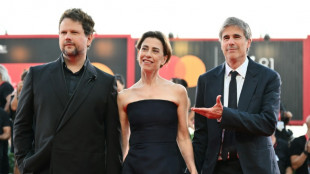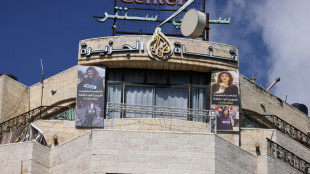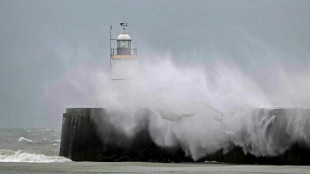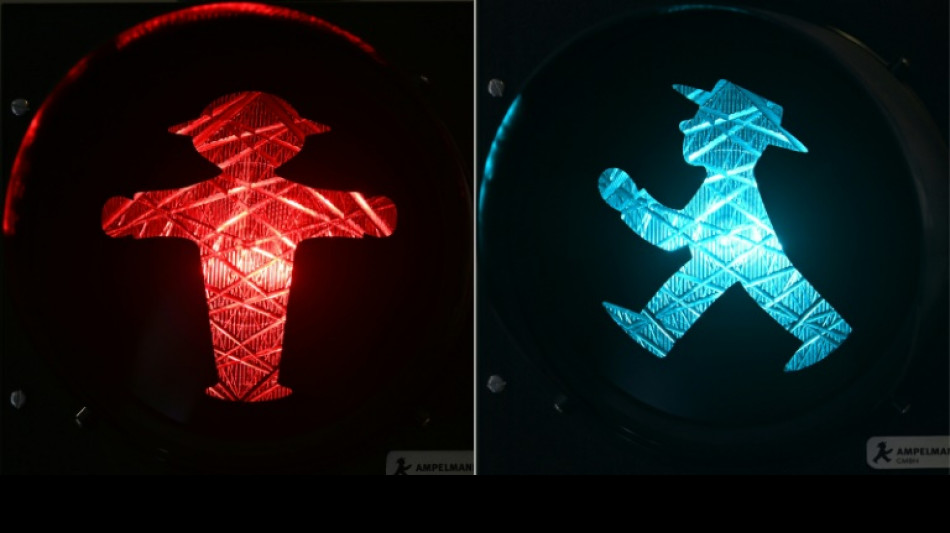
-
 Spain's Canary Islands received record 46,843 migrants in 2024: ministry
Spain's Canary Islands received record 46,843 migrants in 2024: ministry
-
Panama says migrant jungle crossings fell 41% in 2024

-
 UN experts slam Israel's 'blatant assault' on health rights in Gaza
UN experts slam Israel's 'blatant assault' on health rights in Gaza
-
Tesla reports lower 2024 auto deliveries, missing forecast

-
 Meghan Markle's lifestyle show to premiere Jan 15 on Netflix
Meghan Markle's lifestyle show to premiere Jan 15 on Netflix
-
On Bourbon Street, a grim cleanup after deadly nightmare

-
 New Orleans attacker: US Army vet 'inspired' by Islamic State
New Orleans attacker: US Army vet 'inspired' by Islamic State
-
New Orleans killer acted alone, professed loyalty to jihadist group: FBI

-
 Wall Street lifts spirits after Asia starts year in red
Wall Street lifts spirits after Asia starts year in red
-
UK's biggest dinosaur footprint site uncovered

-
 Former Australia coach Langer to take charge of London Spirit
Former Australia coach Langer to take charge of London Spirit
-
Most UK doctors suffer from 'compassion fatigue': poll

-
 Everton boss Dyche unconcerned by Maupay jibe
Everton boss Dyche unconcerned by Maupay jibe
-
FBI probes potential accomplices in New Orleans truck ramming

-
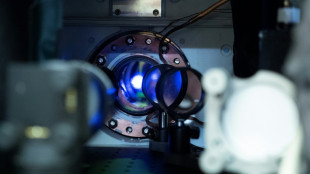 Secret lab developing UK's first quantum clock: defence ministry
Secret lab developing UK's first quantum clock: defence ministry
-
Premier League chief fears Club World Cup's impact on Man City and Chelsea

-
 US mulls new restrictions on Chinese drones
US mulls new restrictions on Chinese drones
-
Wall Street dons early green after Asia starts year in red

-
 Rosita Missoni of Italy's eponymous fashion house dies age 93
Rosita Missoni of Italy's eponymous fashion house dies age 93
-
27 sub-Saharan African migrants die off Tunisia in shipwrecks

-
 UK grime star Stormzy banned from driving for nine months
UK grime star Stormzy banned from driving for nine months
-
Neil Young dumps Glastonbury alleging 'BBC control'

-
 Djokovic, Sabalenka into Brisbane quarters as rising stars impress
Djokovic, Sabalenka into Brisbane quarters as rising stars impress
-
Swiatek battles back to take Poland into United Cup semis

-
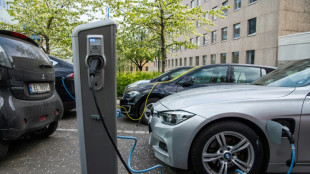 Electric cars took 89% of Norway market in 2024
Electric cars took 89% of Norway market in 2024
-
Stock markets begin new year with losses

-
 Rival South Korea camps face off as president holds out
Rival South Korea camps face off as president holds out
-
French downhill ace Sarrazin out of intensive care

-
 Djokovic cruises past Monfils as rising stars impress in Brisbane
Djokovic cruises past Monfils as rising stars impress in Brisbane
-
Montenegro mourns after gunman kills 12

-
 Sales surge in 2024 for Chinese EV giant BYD
Sales surge in 2024 for Chinese EV giant BYD
-
Agnes Keleti, world's oldest Olympic champion, dies at 103

-
 Asian stocks begin year on cautious note
Asian stocks begin year on cautious note
-
Andreeva, Mpetshi Perricard showcase Australian Open potential

-
 South Korea police raid Jeju Air, airport over fatal crash
South Korea police raid Jeju Air, airport over fatal crash
-
Perera's 46-ball ton gives Sri Lanka consolation T20 win over New Zealand

-
 Afghan refugees suffer 'like prisoners' in Pakistan crackdown
Afghan refugees suffer 'like prisoners' in Pakistan crackdown
-
Coach tight-lipped on whether Rohit will play in final Australia Test

-
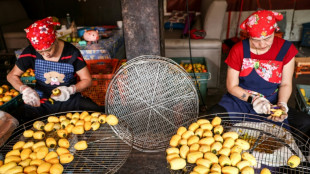 Blooming hard: Taiwan's persimmon growers struggle
Blooming hard: Taiwan's persimmon growers struggle
-
South Korea's impeached president resists arrest over martial law bid

-
 Knicks roll to ninth straight NBA win, Ivey hurt in Pistons victory
Knicks roll to ninth straight NBA win, Ivey hurt in Pistons victory
-
'Numb' New Orleans grapples with horror of deadly truck attack

-
 Asia stocks begin year on cautious note
Asia stocks begin year on cautious note
-
FBI probes 'terrorist' links in New Orleans truck-ramming that killed 15

-
 2024 was China's hottest year on record: weather agency
2024 was China's hottest year on record: weather agency
-
Perera smashes 46-ball ton as Sri Lanka pile up 218-5 in 3rd NZ T20

-
 South Korea police raid Muan airport over Jeju Air crash that killed 179
South Korea police raid Muan airport over Jeju Air crash that killed 179
-
South Korea's Yoon resists arrest over martial law bid

-
 Sainz set to step out of comfort zone to defend Dakar Rally title
Sainz set to step out of comfort zone to defend Dakar Rally title
-
New Year's fireworks accidents kill five in Germany


How East Germany's 'traffic light man' became a beloved icon
As Germany readies to mark 35 years since the Berlin Wall fell, one symbol of the former communist East has become an icon of reunification, seen by millions every time they cross a street.
East Germany's "Ampelmann" or pedestrian "traffic light man" is now instantly recognisable thanks to his chunky outline and wide-brimmed hat.
He almost disappeared along with East Germany in the years after the Wall fell on November 9, 1989, when many other symbols of the German Democratic Republic (GDR) were swept away.
Its polluting Trabant cars were soon headed for the scrap-heap, threadbare state-run shops gave way to Western brands, and grey prefabricated tower blocks got new licks of paint.
The Ampelmann almost went the same way, said Markus Heckhausen, a businessman in his 60s from the western German city of Tuebingen.
He remembered seeing the traffic lights featuring the Ampelmann often lying on the side of the road in the early days of reunited Germany.
Despite being a "Wessi" -- the sometimes pejorative nickname for West Germans -- Heckhausen took up the cause of the Ampelmann and spotted a commercial opportunity.
- 'Modern, body-positive' -
He started collecting the chunky lights to turn them into indoor lamps, while simultaneously launching an appeal for the Ampelmann to be saved on the streets.
The campaign struck a chord with many East Germans who felt "they were losing their identity" as their country was practically subsumed into its Western neighbour, said Heckhausen.
Not only was the Ampelmann saved in the East, but he also became a rare symbol from the GDR to be adopted in parts of the West, including in the former western sectors of long-divided Berlin.
The design was created in 1961 by the state's "transport psychologist" Karl Peglau and became something of a star within East Germany, even popping up in cartoons.
"I had the feeling he was always there during my childhood," said 53-year-old Torsten Foeste, who was born in the GDR town of Greifswald but now lives in Berlin.
Fons Hickmann, a graphic designer and professor at Berlin University of the Arts, said the Ampelmann's enduring popularity is down to his figure's lovable "imperfection".
"The back leg is a little too long, the front one a little too short, the whole figure is quite bulky," he told AFP.
"One could say that it's a very modern, body-positive symbol," he quipped.
- Money-spinner -
Peglau's aim was to create a cute, eye-catching figure which would be readily noticed, especially by children and the elderly, at a time when road accidents were on the rise.
"I think in essence it's such an important idea, saying that road traffic doesn't only belong to cars, but to others too, including pedestrians," said Hickmann.
While still keeping pedestrians safe, the humble Ampelmann has become a big money-spinner too, with Heckhausen following up on the lamps with mugs, T-shirts, soft toys and even USB sticks.
Not that Foeste minds the very capitalist incarnation of his childhood memory that Heckhausen has created: "I say congratulations to him, it's a super idea!"
Heckhausen was even able to convince Peglau to work with him on the products until the latter died in 2009.
Today the Ampelmann business makes millions of euros a year and employs around 80 people, said Heckhausen.
Particularly in Berlin, Ampelmann stores have become something of an obligatory stop for many on the tourist trail.
In one, visitor Petra from the western city of Essen hailed the "chic" design, adding: "I've already bought some schnapps glasses and fridge magnets".
T.Bondarenko--BTB

